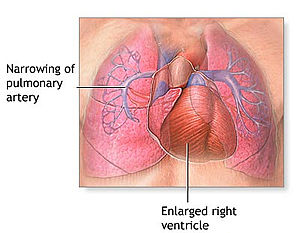
| HIV
Positive People on HAART Have an Elevated Risk of Pulmonary Hypertension As HIV positive people live longer thanks to effective antiretroviral therapy, cardiovascular disease and other non-AIDS-defining organ diseases have become a growing concern. Last week at the 48th International Conference on Antimicrobial Agents and Chemotherapy (ICAAC 2008) in Washington, DC, researchers presented data from a study of pulmonary hypertension -- or high blood pressure in the arteries that supply the lungs -- in people with HIV. As pulmonary hypertension progresses, blood can back up, potentially leading to heart failure.
HIV infection has been implicated as an independent risk factor for pulmonary arterial hypertension, the researchers noted as background, and it has been suggested that antiretroviral therapy may decrease the rate of mortality due to this condition. The investigators performed a cross-sectional study of 91 HIV-infected patients at the National Naval Medical Center. The mean age was 37 years, they had been infected with HIV for an average of about 11 years, the mean duration of antiretroviral therapy was about 5 years, and the median CD4 count was about 580 cells/mm3. None were injection drug users. Data on demographics, HIV-related factors, cardiac risk factors, and antiretroviral therapy were collected. Each study participant underwent a 2-D transthoracic echocardiogram utilizing standard and tissue Doppler techniques to assess pulmonary hypertension (defined as pulmonary artery systolic pressure > 35 mmHg). Results
Based on these findings, the investigators concluded, "This cohort of asymptomatic well controlled HIV patients on antiretroviral therapy at low risk for AIDS and cardiovascular disease had a 5.5% rate of pulmonary arterial hypertension. When present, pulmonary arterial hypertension was mild and asymptomatic." However, they continued, "The prevalence is much higher than reported rates in HIV uninfected [individuals] of similar age and is slightly lower than rates reported in symptomatic AIDS patients." "Our findings were unexpected in our asymptomatic cohort," they added. "It is yet to be determined if antiretroviral therapy effects pulmonary arterial hypertension incidence or prognosis." Natl. Naval Med. Ctr., Bethesda, MD; IDCRP/Uniformed Services Univ. of the Hlth.Sci., Bethesda, MD; Naval Med. Res. Ctr., Silver Spring, MD. 11/07/08 |
The
material posted on HIV and Hepatitis.com about ICAAC 2008 and IDSA 2008 is not
approved by nor is it a part of ICAAC 2008 or IDSA 2008. |
![]()
